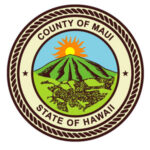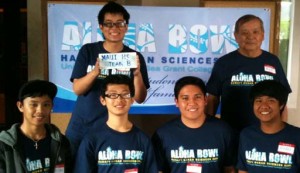
Mar 28, 2012 | Education
 Retired teacher Ed Ginoza left the classroom 12 years ago, but continues to learn as a volunteer mentor and coach for high school students competing in math and science competitions. Ginoza served for nearly 30 years as a teacher, mostly at Maui High School where he taught math and science. Following his retirement, he stepped up to coach high-achiever science students in competitions such as the Science Bowl and the Ocean Bowl. He’s developed relationships with students he never really had when he was working in the classroom. “If you want to influence kids’ lives, you don’t get to know them in the classroom. You get to know them outside of it,” Ginoza said.
Retired teacher Ed Ginoza left the classroom 12 years ago, but continues to learn as a volunteer mentor and coach for high school students competing in math and science competitions. Ginoza served for nearly 30 years as a teacher, mostly at Maui High School where he taught math and science. Following his retirement, he stepped up to coach high-achiever science students in competitions such as the Science Bowl and the Ocean Bowl. He’s developed relationships with students he never really had when he was working in the classroom. “If you want to influence kids’ lives, you don’t get to know them in the classroom. You get to know them outside of it,” Ginoza said.
Motivated by the drive in advanced students at Maui High School, Ginoza said he uses all kinds of tools to prepare for contests including the Internet, videos and high-tech web sites. He and his students have been successful, not only in placing high or winning titles, but also in ensuring that Maui’s brightest are enrolling at the best colleges in the country. For example, Ginoza regularly writes recommendations and assists students applying to the prestigious Massachusetts Institute of Technology in Boston. He said at least one student has been accepted by MIT in all but one of the 29 years he’s helped out. He said students are earning good grades and getting into good colleges because they take advantage of the technology offered to them while also studying hard. “Three hours of studying per night to them is the norm,” Ginoza said.
Aside from helping students, Ginoza works part-time as a resource teacher, helping schools with administrative reports and math improvement programs. “In some ways, teaching has come a long way,” he said. “The good part of it is that technology has come along and teachers have a lot of resources to draw on. They can actually take kids places or observe things we couldn’t do in the past,” he said, referring to videos and Internet resources. “The students are as good, if not better in some respects…Learning is never boring.”

Mar 21, 2012 | Community
 In a time when businesses are struggling, VIP Cash N’ Carry continues to increase sales according to Store Manager, Leila Maddela. The store in Kahului recently updated its digs, expanded its space, increased staff to 30 employees and added more retail to serve the needs of Maui families. The success comes from a commitment to provide “better value for your ohana” and a willingness to respond to a changing client base. “We adapted so we could serve household consumers, not just food service companies,” Maddela said.
In a time when businesses are struggling, VIP Cash N’ Carry continues to increase sales according to Store Manager, Leila Maddela. The store in Kahului recently updated its digs, expanded its space, increased staff to 30 employees and added more retail to serve the needs of Maui families. The success comes from a commitment to provide “better value for your ohana” and a willingness to respond to a changing client base. “We adapted so we could serve household consumers, not just food service companies,” Maddela said.
Valley Isle Produce was established in 1951 by the late Roy Okumura and his wife, Lorraine, who still checks into the store along with her son, Nelson, who serves as the president of the company. As a division of VIP Foodservice, VIP Cash N’ Carry opened in 1986 with five employees, primarily offering products for foodservice customers and families hosting large parties. That changed in the last decade with a move to cater more to families, whether they were having parties or not. “Our customers are family to us. We know our regular customers and serve them with full hearts and a spirit of gratitude,” Maddela said. Since its client base is family, Maddela said the store also promotes family-friendly attitudes toward its staff, offering profit sharing bonuses, holding appreciation luncheons and supporting associates in their time of family loss. “We try to support each other,” she said.
Even in its success, Maddela said there is still much more to be told as she finds instances when people are surprised at the broad selection of retail products in the store. Its store name also appears to give the incorrect impression about forms of payments — VIP Cash N‘ Carry accepts cash, major credit cards, debit cards and checks. There are plans in place to open a second location in West Maui. “The future looks great as we continue to provide better value for the ohana of Maui,” Maddela said.
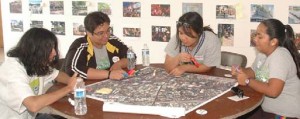
Mar 15, 2012 | Community
 Youth Alliance members impressed an expert Maui County planner with ideas about how Wailuku could become a more thriving community. As the supervising planner for the County’s Long Range Planning Division, David Yamashita is charged with overseeing a project called reWailuku. The Wailuku Community Association, the County Planning Department and the Maui Redevelopment Agency coordinated “ReWailuku” as a means to collect community comments on plans to revitalize the historic town. Visiting the community design project gave the Youth Alliance members a chance to provide their perspective to the reWailuku team. “Adults and youth look at things in a whole different way. It was really helpful to hear from the youth,” Yamashita said.
Youth Alliance members impressed an expert Maui County planner with ideas about how Wailuku could become a more thriving community. As the supervising planner for the County’s Long Range Planning Division, David Yamashita is charged with overseeing a project called reWailuku. The Wailuku Community Association, the County Planning Department and the Maui Redevelopment Agency coordinated “ReWailuku” as a means to collect community comments on plans to revitalize the historic town. Visiting the community design project gave the Youth Alliance members a chance to provide their perspective to the reWailuku team. “Adults and youth look at things in a whole different way. It was really helpful to hear from the youth,” Yamashita said.
King Duke, a junior at Maui High School, said: “The reWailuku event taught me a lot about how a community thrives. I really respect what they are doing with the fact that they are trying to remember what was good about Wailuku,” Taking its cues from the Youth Alliance, the reWailuku team plans to incorporate the idea of creating a place for young adults to gather and “hang out” in Wailuku, Yamashita said. “We call it the third place,” he said, adding that a person’s first place is home and the second might be school or the workplace. Yamashita said the purpose of reWailuku is to “create a Wailuku for the next generation.”
Having heard from both adults and youth in the community has helped the Planning Department come up with a solid plan for the Central Maui town. “Wailuku should be a walkable town,” Yamashita said. A public presentation on the reWailuku project findings will be made on March 28. More information is available at reWailuku.com. Duke said he and other Youth Alliance members enjoyed sharing ideas and envisioning the future of Wailuku. “Maui should keep its Hawaiian feel, a paradise of sorts where everything is beautiful and you don’t want to stop walking because there’s so many great places to go with such friendly people.”
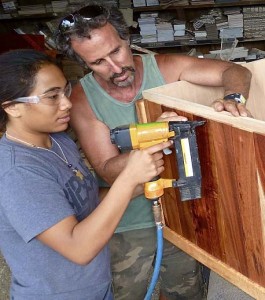
Mar 8, 2012 | Community

Rick Rutiz with Hana School student, Christine Naihe.
Carpenter Rick Rutiz has developed an award-winning program that boosts self-esteem in Hana’s youth, while building much needed facilities in their community. The Hana School Building Program “Ma Ka Hana Ke ‘Ike” (“in working, one learns”) started 12 years ago with Rutiz guiding a small group of struggling high school students with a task to build a counselor’s office on their campus. From there, more students joined Rutiz’s program and they began tackling projects that required even more specialized skills such as artistic tiling, building with bamboo and renovating facilities to make them accessible to the handicapped. The program began with funding support from small contractors like Rutiz and has since won awards and grants from private citizens, government, the Office of Hawaiian Affairs and private foundations.
Today, Ma Ka Hana Ke ‘Ike has graduated 100-plus students, many of whom have landed jobs in the construction field and others who went on to college, equipped with knowledge of how to use basic tools. “Many of our kids have not had an easy time in the classroom. But we found that through our program, they gained life skills, they built their self-esteem and they finally found something they can do and do well,” Rutiz said. “They have learned to find success in themselves.”
The newest component of the Hana Building Program features graduate apprentices who support Rutiz by mentoring younger students. “It’s just great to see them teach younger kids. Our apprentices are continuing to learn, but they’re also helping me with training so that we can perpetuate this program,” Rutiz said. “I’m very proud of my graduates. They’re incredible and most of them have surpassed what I thought they could do.” Rutiz said the program inspires him. “I get to work every day and see this lighting up of self-confidence and self-worth in my students. It’s awesome, absolutely awesome.”
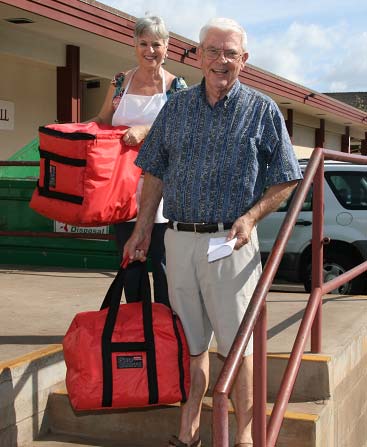
Feb 29, 2012 | Community
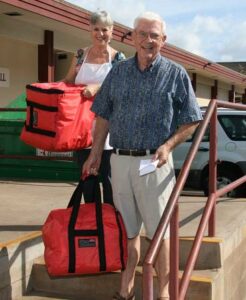
Bob and Barbara Spaulding
Husband and wife Bob and Barbara Spaulding deliver hot meals every Sunday, nine months out of the year, to South Maui’s homebound, frail, elderly and disabled. The Spauldings are amongst 28 volunteers who regularly transport cooked meals-to-go from Hale Kau Kau, a soup kitchen aimed at curbing hunger on the island. On each trip, the Spauldings deliver food to as many as 15 homes, taking the time to visit with grateful recipients who are unable for various reasons to shop or cook their own meals. “It’s extremely rewarding to know we feed not only their basic needs, but the soul as well,” Bob Spaulding said. “I realize sometimes it’s the only human contact they have that day,” added Barbara, Spaulding’s wife of 55 years.
The Spauldings say in the 10 years they’ve delivered meals, they’ve experienced great support for the work they do. “Whenever we’ve needed to make a left turn on South Kihei Road, someone gives way. It’s the Maui way, others make allowances so you can do what you need to do,” Mr. Spaulding said. Since the fiscal year opened on July 1, Hale Kau Kau has prepared more than 34,000 meals, a 13 percent increase over the same time period the year before. About three-quarters of the last six month’s meals are served out of a kitchen at St. Theresa Church in Kihei; the rest were delivered to the homebound. The meal program for the homebound has been in existence for about 12 of the 20 years Hale Kau Kau has operated.
Hale Kau Kau’s major fundraiser of the year takes place Saturday at the Wailea Beach Marriott Resort and Spa. The event features live and silent auctions, a buffet dinner with no host bar, and entertainment by local performers Louise Alborano and Tarvin Makia opening for headliner Makana, Hawaii’s youngest slack key guitar master. To attend the fundraiser or make a donation, call 875-8754 or e-mail: hkkmaui@yahoo.com or hkkmariet@gmail.com
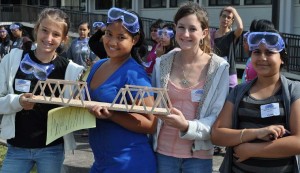
Feb 22, 2012 | Innovation
 National Engineering Week is well on its way here on Maui where more than 75 students are immersed in a variety of opportunities to explore the field of engineering. This is the 11th year in which Maui Economic Development Board’s Women in Technology program has taken the lead in coordinating the weeklong event that runs through this Saturday. Partners include the Air Force Research Laboratory, Hawaii Society of Professional Engineers Maui Chapter, the County of Maui and local engineering firms. With fewer than 5 percent of Hawaii’s engineers being women, National Engineering Week is important as it exposes young girls to engineering as a career.
National Engineering Week is well on its way here on Maui where more than 75 students are immersed in a variety of opportunities to explore the field of engineering. This is the 11th year in which Maui Economic Development Board’s Women in Technology program has taken the lead in coordinating the weeklong event that runs through this Saturday. Partners include the Air Force Research Laboratory, Hawaii Society of Professional Engineers Maui Chapter, the County of Maui and local engineering firms. With fewer than 5 percent of Hawaii’s engineers being women, National Engineering Week is important as it exposes young girls to engineering as a career.
Introduce a Girl to Engineering Day has more than 250 middle school students participating from Maui County. An engineering expo event will feature 40 students in hands-on activities that expose them to various engineering fields. Other activities include Maui Electric Co. hosting 12 girls on a tour of their central plant, a career shadowing with MECO engineers and an activity that shows them how to build their own circuit boards. In the County’s Wastewater Reclamation Division, 10 girls are poised to learn about civil engineering and the important role of a wastewater treatment plant. Iao Intermediate School student Christine says it all: “Going to an engineer’s worksite and seeing what a big role they have in our community inspired me to pursue engineering as a career.”
Engineering In the Middle competitions are also in the mix including Popsicle Bridge Building and Marshmallow Launcher contests. There are five participating schools — Lokelani Intermediate, Maui Waena Intermediate, Iao School, Kalama Intermediate and Molokai Middle School. Winners will go on to compete at the University of Hawaii at Manoa’s Jr. Engineering Expo in March. For information about the Women in Technology program, please visit www.womenintech.com or contact Mapu Quitazol at 875-2343 or at mapu@medb.org.
Feb 15, 2012 | Environment
 Maui filmmakers Joe Imhoff and Sara Tekula set out to plant native trees in every state, and now they want to document the project. The husband-and-wife team founded the nonprofit “Plant a Wish” and embarked on a tour of all 50 states on Memorial Day 2010, planting native trees in each state and culminating Nov. 5, 2011, in Hawaii. A caretaker for each tree in each state was identified, and overall Imhoff and Tekula put in more than 1,000 native trees at dozens of community planting events across the country.
Maui filmmakers Joe Imhoff and Sara Tekula set out to plant native trees in every state, and now they want to document the project. The husband-and-wife team founded the nonprofit “Plant a Wish” and embarked on a tour of all 50 states on Memorial Day 2010, planting native trees in each state and culminating Nov. 5, 2011, in Hawaii. A caretaker for each tree in each state was identified, and overall Imhoff and Tekula put in more than 1,000 native trees at dozens of community planting events across the country.
From Washington to Wyoming, Texas to Tennessee, the duo learned all things native and shared with others the story of Maui’s battle with alien species and loss of indigenous plants and animals. They also explained efforts to repair and restore the effects of trees on human health and the community’s overall environment. “Along the tour, it all began to make so much sense that every living thing has a purpose and those purposes are all connected. That was really meaningful for me,” Tekula said. Imhoff added: “I learned that the power of belief is very effective when doing good things for the world.” Their project was funded by donors who contributed varying amounts from $1 to $2,500. So far, they’ve raised approximately $20,000 for the project.
“What surprised me the most was how many doors of opportunity opened up for us as our mission evolved,” Imhoff said. He and Tekula got access to expert conservationists, educators and authors interested in tree planting and preservation and how they contribute to a healthy environment. “The biggest surprise I think I experienced was the unfortunate amount of sheer devastation we saw happening at the hands of our fellow human beings,” Tekula said. In some places, Tekula said they saw environmental devastation to mountaintops and toxic waste dumps. They found communities where people didn’t know which plants were native to their area. At the end, the couple collected reams of video and photos that recorded the story of their journey. They would like to share the information in a documentary and need public support to do just that. Go to: http://www.plantawish.org/donate.
Photo by Sean Michael Hower
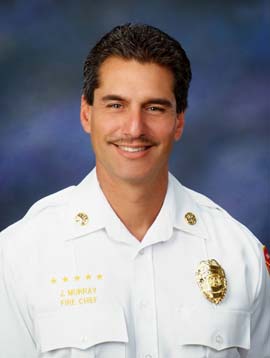
Feb 8, 2012 | Community

Fire Chief Jeff Murray
Continuing our series on newly appointed County Department Directors, reflecting the role of government in responding to community values and needs.
The son of a retired corrections officer and preschool teacher, Maui County Fire Chief Jeff Murray is living a lifelong dream to serve his community in a very special way. “I love my job,” Murray said. In his position, Murray leads a staff of 300 uniformed firefighters and 12 civilians and oversees a budget of $29 million. A 1983 graduate of Maui High School, Murray began his career as a firefighter when he enlisted in the United States Air Force in 1984 and served in places like Texas, Illinois, South Korea and Honolulu. He returned home in 1989 and has since worked in practically every fire station on Maui. Murray is married, has four children and enjoys surfing, diving, fishing and baseball.
He brings to work a number of values instilled in him while growing up on Maui. These include integrity, compassion, professionalism and a sense of community. Murray said he prefers to seek input from staff before making decisions. “I like to look at things from all aspects. For the most part, I like to have as much participation as possible.” But as a leader when he’s pressed, he’s not afraid to trust his experience and instincts and make timely decisions on his own.
Murray says the best thing that residents can do to assist firefighters and other emergency responders is to post visible signage on their homes and provide clear and specific directions to their addresses. He said he’s not aware of a situation when a delayed response caused major damage or any loss of life. “We shouldn’t have to wait for a situation like that. We always want to be proactive.”
The Maui County Fire Department responds to a range of calls from fires to ocean and mountain rescues to the safe containment of hazardous materials. Firefighters are also dedicated to educating the community about fire safety. They conduct regular safety briefings with private companies and they reach thousands of school-aged children every year with fire station visits and Fire Prevention Week activities.
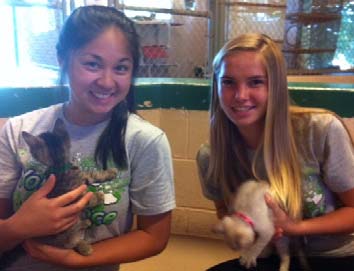
Feb 1, 2012 | Community, Environment
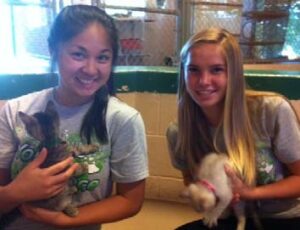
The Maui Humane Society’s mission to forge lifelong bonds between people and animals through education, community outreach and the prevention of cruelty, resonated recently with members of the Focus Maui Nui Youth Alliance. Lahainaluna High School freshman Kaile Stockham was so impressed on a recent visit that she plans to enroll as an adult volunteer at the animal shelter when she turns 18. “I think it’s incredible the work that the Maui Humane Society does. They’re doing a good job to care for the animals.” With Kaile’s urging, the Youth Alliance toured the Maui Humane Society in January to learn about its mission and work for animals. “I learned a lot that I didn’t know about animals and how they’re treated,” Kaile said.
For their part, members of the Youth Alliance learned they could join the Junior Animal Advocate Group of Maui, a program of volunteers in grades 6 to 12 at the Maui Humane Society. They also got details on the Humane Society’s open admissions policy and commitment to finding homes for stray and abandoned animals. “They always want to get as many adoptions as possible,” Kaile said.
A four-year Youth Alliance member, Kelsie Chong, visited the Maui Humane Society with a new appreciation. “I thought it was a really fun place and very educational,” Kelsie said. Her family adopted a mixed breed dog about eight years ago from Maui Humane Society. The dog is part of a host of animals in the Chong residence. Kelsie also has four cats, a fish and 10 canaries. “I love them all. They’re innocent, they’re cute. They just make me happy.” Both Kaile and Kelsie said they were glad to see that the Maui Humane Society strives to seek all options for animals including shipping them off to less crowded shelters on Oahu. “I think it’s pretty sad the animals don’t have a home to go to, but the Maui Humane Society is doing its best to change that.”
Jan 25, 2012 | Small Business

From left: Sisters Gail Saito and Cindy Tasaka-Ing and their cousin, Kelly Kohatsu
A family business with nearly 100 years of history lives on today in Cindy Tasaka-Ing and her sister, Gail Saito. The two are the owners and operators of Tasaka Guri-Guri, a homegrown snack shop founded by their greatgrandfather Jokichi Tasaka. He created the store’s hallmark guri-guri, a frozen dessert featuring a cross between sherbert and ice cream. Guri-guri is served in scoops of two flavors — strawberry and pineapple. Tasaka’s son, Gunji, perfected his father’s recipe, and his sons, Setsuo and Henry — Cindy and Gail’s dad — kept the recipe secret and continued the thriving business for about 35 years until retiring recently when the operations were officially handed to Henry’s daughters.
Cindy and Gail have one other employee, their cousin, Kelly Kohatsu, and get a lot of help from Henry’s long-time friend, Tony Ishikawa. “It’s a small business, we’re doing okay, why change it?” Cindy Tasaka-Ing said. Aside from the secret family recipe for guri-guri, Cindy and Gail manage Tasaka Guri-Guri just like their great-grandfather, grandfather and father did — no computer, no fax, no copier, no Web site. “Our business comes from word of mouth,” she said. Tasaka Guri-Guri switched from its site at the old Kahului Center nearly 100 years ago to the Maui Mall where they’ve had the shop for about four decades now.
Tasaka-Ing said the store welcomes a range of people from loyal residents who stop by every day for a scoop of guri-guri to visitors from the Mainland and others who want to take a quart or two to the Neighbor Islands. Tasaka-Ing said the shop has been successful in part “because our prices are relatively low.” Two scoops of guri-guri in a cup is priced at $1.20 and rises up to five scoops for $2.85; it can also be bought by the quart. Tasaka-Ing said she and her sister aren’t interested in selling the family recipe and hope that one day, their own children — most of whom are 12 years or younger — will take over the business.

 Retired teacher Ed Ginoza left the classroom 12 years ago, but continues to learn as a volunteer mentor and coach for high school students competing in math and science competitions. Ginoza served for nearly 30 years as a teacher, mostly at Maui High School where he taught math and science. Following his retirement, he stepped up to coach high-achiever science students in competitions such as the Science Bowl and the Ocean Bowl. He’s developed relationships with students he never really had when he was working in the classroom. “If you want to influence kids’ lives, you don’t get to know them in the classroom. You get to know them outside of it,” Ginoza said.
Retired teacher Ed Ginoza left the classroom 12 years ago, but continues to learn as a volunteer mentor and coach for high school students competing in math and science competitions. Ginoza served for nearly 30 years as a teacher, mostly at Maui High School where he taught math and science. Following his retirement, he stepped up to coach high-achiever science students in competitions such as the Science Bowl and the Ocean Bowl. He’s developed relationships with students he never really had when he was working in the classroom. “If you want to influence kids’ lives, you don’t get to know them in the classroom. You get to know them outside of it,” Ginoza said.











